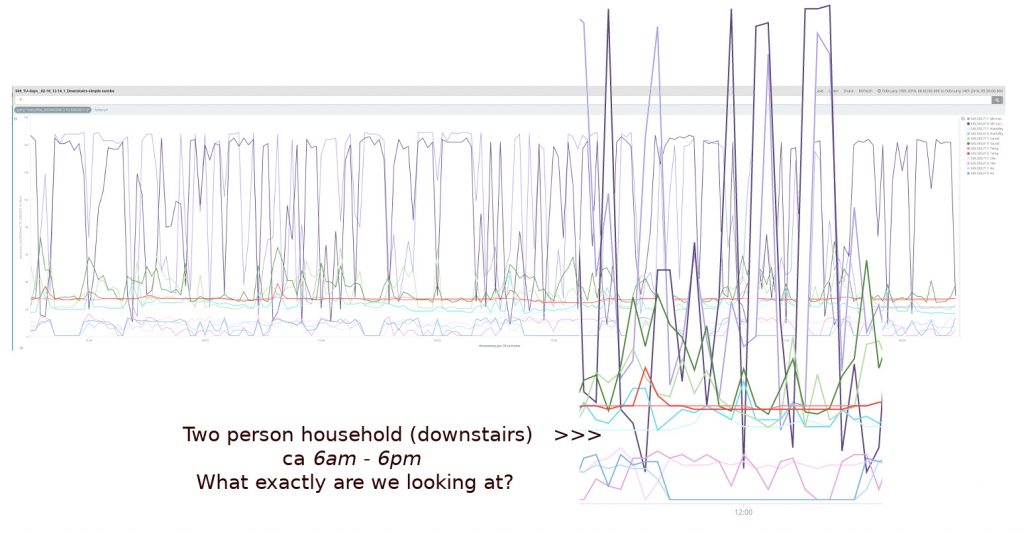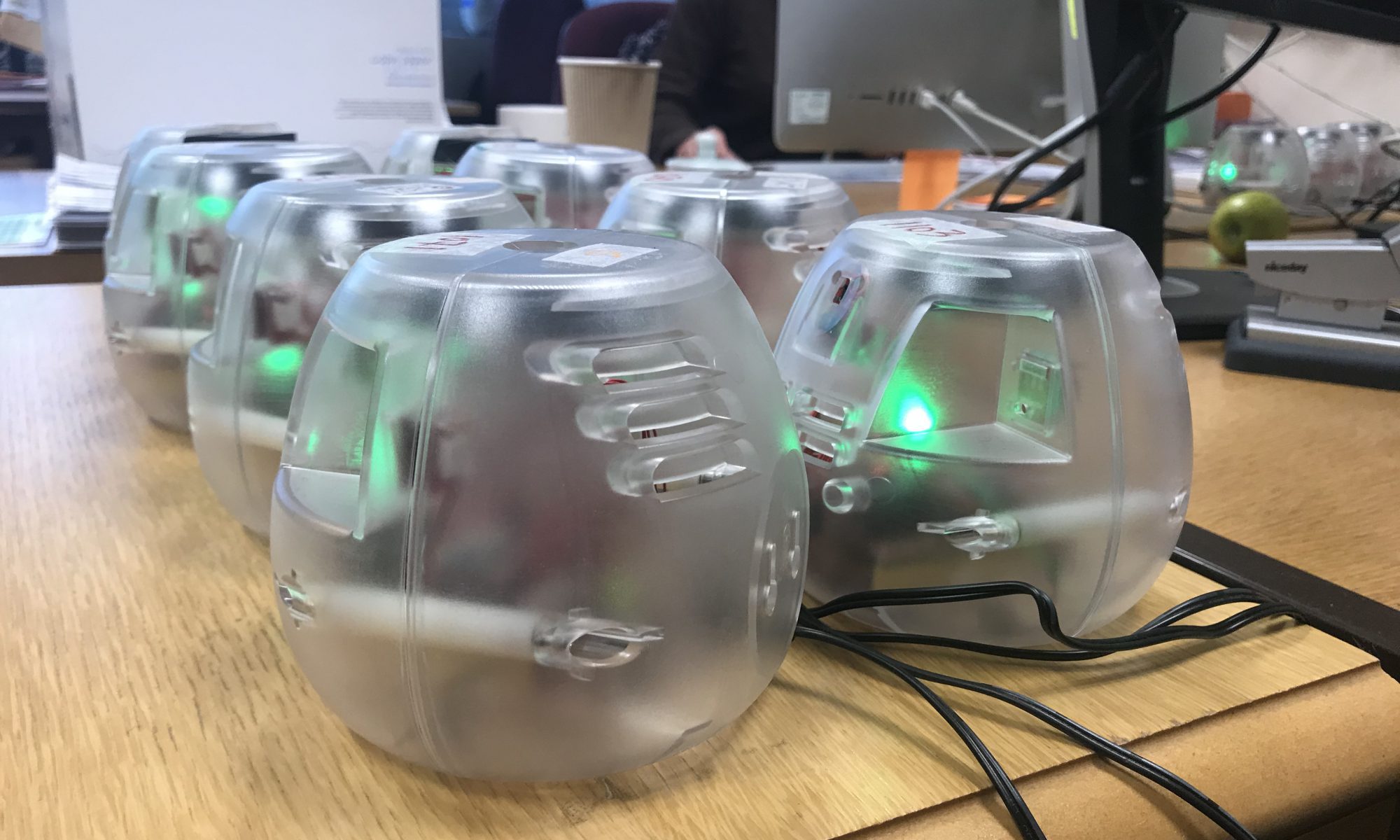Guidelines on using sensors in social research …underway …
Publications and reports … expand
Jiang J., Pozza, R., Gilbert N. and Moessner K. (2019). MakeSense: An IoT Testbed for Social Research of Indoor Activities. Preprint on arXiv:1908.03380 [cs.HC].
Jiang J., Hoogendoorn M., Kong Q., Roijers D.M. and Gilbert N. (2018). Predicting Appliance Usage Status In Home Like Environments. In 2018 IEEE 23rd International Conference on Digital Signal Processing (DSP). IEEE 2018. ISBN: 1538668122, 9781538668122.
Jiang, J., Pozza, R., Gunnarsdóttir, K., Gilbert, N. and Moessner, K. (2017). Using Sensors to Study Home Activities. Journal of Sensors and Actuator Networks 6(4), 32. doi:10.3390/jsan6040032.
Jiang, J., Pozza, R., Gunnarsdóttir, K., Gilbert, N. and Moessner, K. (2017). Recognising Activities at Home: Digital and Human Sensors. In Proceedings of ICFNDS ’17, Cambridge, United Kingdom, July 19-20, 2017, 11 pages. Doi:10.1145/3102304.3102321.
Field trial data …
The HomeSense dataset contains sensor-generated, interview, questionnaire, ethnographic and time-use diary data. These data are available for examination, reuse and/or future research. We are particularly interested in collaboration addressing the problem of contextual visualisation, i.e., in pursuing interesting and novel amalgamations of sensor-generated and qualitative types of data … more
-
- HomeSense_data-README.pdf …explains the contents of HomeSense_data.zip:
P.1 What is included in the HomeSense data archive?
P.2 Ethnographic notes
P.3 Walking interviews
P.3 Questionnaire 1 ( Q-1 )
P.4 Time-Use diaries
P.4 Final interviews
P.4 Questionnaire 2 ( Q-2 )
P.4 Conditions for sharing and use of the data (participants’ consent)
- HomeSense_data-README.pdf …explains the contents of HomeSense_data.zip:

Visualisation tools can be very effective for monitoring live data streams and making sure that sensors are online and working normally. They are also effective for getting a sense of what the sensor-generated data represent (live data streams and/or static extracts from databases), i.e., in preparation for automated data sorting and analyses, activity recognition and the like.
It follows that visualisation tools are not used primarily as data-analytic tools but as managerial and browsing tools or, say, a pre-analytic aid. Typically, large amounts of sensor-generated data are filtered through pre-processing and learning algorithms that are premised on blind computational keyhole access to the world at hand. These methods can demonstrate, among other things, that the sensors and the computational capabilities get it right — some already hypothesised (and/or established) awareness of human activities and interactions, presence / absence, device use, and more. They underpin developments in IoT-based products and services aimed at behaviour intervention and everyday assistance.
Using sensors for observational social research (sociology and adjacent disciplines) may share some of these objectives or be focused on entirely different ones. A serious consideration of using sensors and associated technologies calls for clarity on the unique value and/or added value of collecting and processing sensor-generated data in relation to (and compared with) other methods in the sociologist’s arsenal. It would therefore be one significant step forward, for example, if sensor data visualisations could be rendered contextually in a qualitative data universe and, thereby, those visualisations enabled as analytic tools in their own right. Click here for discussion about visualising in meaningful ways, discussion of a number of examples to shed light on the issue.
Interviews, questionnaires, time-use diaries and ethnographic notes from the HomeSense field trial have all been uploaded to the UK Data Archive and are also available here:
Research events and presentations
A record of outreach activities for the duration of HomeSense … expand
14 December 2018: Kristrún Gunnarsdóttir presented, Resourcing the data ecosystem in observational research: what are the assumptions and what to expect? at the Data and the Digital in Platform Societies (conference), University of Surrey.
19-21 November 2018: Jie Jiang presented, Predicting Appliance Usage Status In Home Like Environments at the 2018 IEEE 23rd International Conference on Digital Signal Processing (DSP) in Shanghai, China.
3 July 2018: The HomeSense team organised the session, Sensors in social research (programme) at the 8th ESRC Research Methods Festival, University of Bath (3-5 July), reporting on a number of sensor-based research projects in the UK. Convenors: Prof. Nigel Gilbert and Dr Kristrún Gunnarsdóttir. Presenters: Dr Jie Jiang, Dr Alison Burrows, Dr Benjamin Bedwell and Dr Kristrún Gunnarsdóttir.
3 July 2018: Kristrún Gunnarsdóttir presented, Sensors as an observational method: confidence and trust between researchers and study participants at the 8th ESRC Research Methods Festival, 3-5 July 2018, Bath.
3 July 2018: Jie Jiang presented, Sensor-generated data: visualisations and analytic options (A/V recording) at the 8th ESRC Research Methods Festival, 3-5 July 2018, Bath.
May-June 2018: Jie Jiang spent a month at the Computational Intelligence Group in the CS department, Vrije Universiteit in Amsterdam, working with Prof. Mark Hoogendoorn on machine learning methods for home activity recognition, household energy disaggregation and indoor localisation based on HomeSense field-trial data. News blurb.
5 March 2018: 5G Innovation Centre (University of Surrey), Klaus Moessner invited Dr George Oikonomou from SPHERE (University of Bristol), who illustrated and explained the technical and organisational features of the SPHERE field trial in participants’ households.
14 December 2017: Jie Jiang presented HomeSense research at the Centre for Vision, Speech and Signal Processing (CVSSP) at Surrey University.
6-7 December 2017: Kristrún Gunnarsdóttir spoke on managing ground truth in HomeSense data analyses at a symposium on post-truth at the TIK Centre for Technology, Innovation and Culture, University of Oslo, Norway.
7-8 September 2017: Jie Jiang presented, Using IoT to study life at home at the Joint UK/Japan Workshop on Acceptability and Value of IoT in the Home. The British Embassy in Tokyo.
19-20 July 2017: Jie Jiang presented (with Riccardo Pozza), Recognising Activities at Home: Digital and Human Sensors at the International Conference on Future Networks and Distributed Systems (ICFND’17), Cambridge, UK. News Blurb.
13 May 2017: The HomeSense team operated a full-day demonstration of HomeSense technology, Making sense of the 21st century household, at the Festival of Wonder, celebrating the 50th anniversary of the University of Surrey.
9 May 2017: Kristrún Gunnarsdóttir organised a seminar at the 5G Innovation Centre (University of Surrey), inviting Dr Pete Woznowski and Dr Alison Burrows to speak on social-anthropological and engineering research for the SPHERE project (Sensor Platform for HEalthcare in a Residential Environment) at the University of Bristol. Flyer.
4 April 2017: Kristrún Gunnarsdóttir (w/HomeSense team) hosted, Sensors in Research (summary report), an open inter-departmental event at the University of Surrey, aimed at knowledge exchange and dialogue among researchers who use sensors/actuators in their research.
11 March 2017: Nigel Gilbert presented, Using digital sensors to understand activity in the home by invitation to a NatCen seminar in London.
27 January 2017: Kristrún Gunnarsdóttir presented, The right to mine data: Insights from social research by invitation to speak at a panel session on data mining at the 2017 Computer Privacy and Data Protection (CPDP) Conference, 25-27 January in Brussels.
23 January 2017: Nigel Gilbert and Jie Jiang presented, The HomeSense project, findings to-date at the 2017 NCRM Annual Centre Meeting in Southampton.
19 January 2017: Jie Jiang attended a workshop and seminar on Sequence Analysis and STATA, organised by Morten Wahrendorf at the University of Manchester.
1 December 2016: Kristrún Gunnarsdóttir and Jie Jiang presented, Making sense of the household by invitation to SPHERE, an EPSRC Interdisciplinary Research Collaboration (IRC) based at the University of Bristol. Events Programme.
10 October 2016: Kristrún Gunnarsdóttir and Jie Jiang presented, Sensing work at home: Insights from using sensors in household research by invitation to an ESRC Seminar event, Microenterprise, technology and big data: new forms of digital enterprise and work and ways to research them (session on exploring new data and methods). University of Southampton.
10 October 2016: Klaus Moessner presented HomeSense as part of, One view on future cloud research at the 2016 Korea-EU Coordinated Calls R&D Conference in Seoul, Korea.
7 October 2016: Klaus Moessner presented HomeSense as part of, IoT not only as smart city enabler but as research enabler for other disciplines… at the 6th Japan-EU Symposium on ICT Research and Innovation in Tokyo, Japan.
27 September 2016: Dr Kristrún Gunnarsdóttir joined by invitation a workshop on specifying and characterising rich data organised by RICHFIELDS (Horizon2020 GA: 654280) at the Exchange Avenue, Schiphol, Amsterdam.
5 July 2016: Prof Nigel Gilbert convened the session, The Ethics of Sensors at the 7th NCRM Research Methods Festival, University of Bath (5-7 July). Presenters: Prof. Nigel Gilbert, Dr Ewa Luger, Dr Malcolm Fisk and Prof Barry Brown.
5 July 2016: Prof Nigel Gilbert presented, The ethics of sensors in the home (A/V recording) at the 7th ESRC Research Methods Festival, 5-7 July 2018, Bath.
20-21 June 2016: HomeSense organised INSIGHTS, a two-day workshop in London with experts in ethics and legal scholarship, IoT and home automation, using sensors in time-use research, in psychology research, computer-human interaction studies and citizen initiatives (Quantified Self). Programme w/ presentations.
1 June 2016: Kristrún Gunnarsdóttir presented, Look, we can measure all this stuff! at a research event in the Sociology Department, University of Surrey.
19 April 2016: Nigel Gilbert presented, An introduction to HomeSense at the 2016 NCRM Annual Centre Meeting in Southampton.

